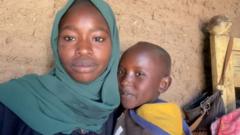The ban affects multiple countries in distress, halting hopes of refuge for their citizens.
Travel Ban’s New Hardship for People in Conflict Zones

Travel Ban’s New Hardship for People in Conflict Zones
Trump's recent travel ban creates barriers for those fleeing war and oppression.
In the wake of global unrest, the Trump administration has issued a sweeping travel ban that profoundly impacts citizens of war-torn nations such as Myanmar and Afghanistan. Beginning Monday, the directive aims to limit immigration from countries identified as having a significant presence of terrorism, further complicating the already dire situations for many.
In Myanmar, a country recently battered by military coups and civil strife, the ban adds to the hardships faced by its citizens who are seeking asylum and stability in the United States. Along with Myanmar, the travel restrictions also encompass a list of nations including Chad, the Republic of Congo, Equatorial Guinea, Eritrea, Haiti, Iran, Libya, Somalia, Sudan, and Yemen, all of which experience varying degrees of conflict and repressive governance.
For many who hoped to escape violence, the announcement casts a long shadow over their aspirations for safety as they are now barred from pursuing lives in the U.S. Additionally, citizens from several other nations—including Burundi, Cuba, and Venezuela—will also face limitations on entering the U.S. for non-immigrant purposes such as tourism and education, further exacerbating the plight of those in need of refuge.
Trump’s assertion that the U.S. will not permit entry to individuals perceived as threats reflects a broader stance on national security that has significant repercussions for those fleeing turmoil. As these developments unfold, the fear is palpable among displaced communities, whose dreams of resettlement in a safer environment have been quashed by the stroke of a pen.
In Myanmar, a country recently battered by military coups and civil strife, the ban adds to the hardships faced by its citizens who are seeking asylum and stability in the United States. Along with Myanmar, the travel restrictions also encompass a list of nations including Chad, the Republic of Congo, Equatorial Guinea, Eritrea, Haiti, Iran, Libya, Somalia, Sudan, and Yemen, all of which experience varying degrees of conflict and repressive governance.
For many who hoped to escape violence, the announcement casts a long shadow over their aspirations for safety as they are now barred from pursuing lives in the U.S. Additionally, citizens from several other nations—including Burundi, Cuba, and Venezuela—will also face limitations on entering the U.S. for non-immigrant purposes such as tourism and education, further exacerbating the plight of those in need of refuge.
Trump’s assertion that the U.S. will not permit entry to individuals perceived as threats reflects a broader stance on national security that has significant repercussions for those fleeing turmoil. As these developments unfold, the fear is palpable among displaced communities, whose dreams of resettlement in a safer environment have been quashed by the stroke of a pen.




















